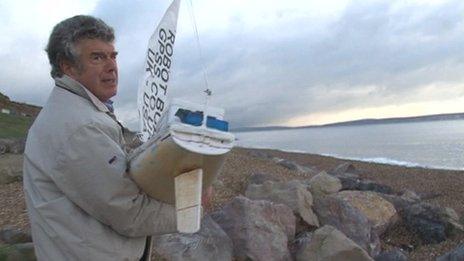Model boat Snoopy Sloop on unmanned Atlantic crossing challenge
- Published

Snoopy Sloop was launched from Barton-on-Sea beach
A retired Nato scientist has launched what he hopes will be the first unmanned boat to cross the Atlantic.
Robin Lovelock's 4ft (1.2m) boat, Snoopy Sloop set sail from the Hampshire coast.
A Global Positioning System (GPS) computer is designed to pilot the boat for the 5,000 miles (8,000km), but he admitted it would be a "real struggle".
The boat would take six months to complete the trip, travelling at 3mph
It is thought no unmanned boat has ever crossed the Atlantic. Recent tries hit weather and technical problems.
Mr Lovelock has developed the 拢450 boat on Bray Lake near his home in Sunninghill, Berkshire, over the past four years.
He is making the attempt as part of the Microtransat Challenge to become the first unmanned vessel to cross the Atlantic Ocean from a point to the south of Ireland.
A tracking device on board the solar-powered boat allows internet users to on its pre-programmed journey from Barton-on-Sea to the Bahamas on his website.
Travelling at 3mph, it would take about six months to complete the trip.
The boat has a model of Snoopy at the bow
He said: "We'll just throw it into the water and see if we're lucky.
"I'm kissing bye-bye to a lot of hard work - let's hope it doesn't all end in tears.
"The chances of something hitting it are pretty remote - it should just get brushed aside."
Alongside the home-built technology on the boat is a model of cartoon dog Snoopy at the bow, which Mr Lovelock said showed he was not taking the project "too seriously".
"If it doesn't work I've got plenty of other boats and bits of boats sitting around the house," he said.
Since 2010, two French boats have foundered in bad weather and a University of Aberystwyth vessel suffered technical failure.
- Published12 October 2012
- Published21 September 2012
- Published26 March 2012